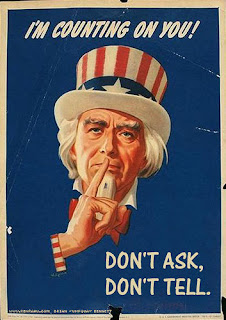
By Steve Gida
Determined to carry out a campaign promise that was a focal point of his campaign, President Obama and his administration are now seeking Congress to repeal the controversial 1993 military law, "Don't Ask, Don't Tell", in order to continue to have the support of the LGBT minority of America and to ease the tension that usually discourages gays from enlisting in the miltary.
The controversial law was enacted by President Bill Clinton in 1993 in order to protect soldiers from having to reveal their orientation to prevent vilification and redicule from fellow soldiers. The law states that enlisted and officials of the military are prevented from inquiring about the sexual orientation of any military personnel, and bars soldiers from responding to said questions. It bars homosexual men and women from actively serving in the U.S. Armed Forces.
From an oppositional viewpoint on this matter, CNN interviewed Navy Airman Lindsey Runkle, who said that "in a way, I think it should just be left alone... I think everything's fine the way it is now. ... if you get rid of it, I think it'll just cause way too many problems." (1)
However, there are those who share a different perspective on the matter. Former Amry sergeant Darren Manzella, who was discharged from the DADT law after actively serving in Iraq, "said that if anything, coming out to his unit 'brought us closer together...it brings trust,' he said, 'It [makes] unity stronger.'"
Defense Secretary Robert Gates and Joint Chiefs of Staff Chairman Admiral Mike Mullen, who both favor the repeal of the law, are testifying before a congressional panel, stating how ending DADT would encourage Americans of any orientation to enlist in the military, thereby boosting enrollment overall and giving each and every American the opporutunity to show their love and patriotism of our nation and flag. "Retired Army Gen. Colin L. Powell, who was instrumental in crafting what was seen as a compromise in 1993, now says lifting the ban is 'he right thing to do.'
"If the chiefs and commanders are comfortable with moving to change the policy," Powell told the Washington Post, "then I aupport it." (2)
The tidal wave of support on Capitol Hill is apparently a view shared by "seventy-five percent of Americans in a 2008 Washington Post-ABC News poll", who endorse repealing DADT in order to prevent the stress and pressure gays and lesbians endure each day in the military, wondering if each day would be their last to serve their nation. Even those who are on their way to the recruiting station feel the tension, the guilt of having to conceal their lifestyle in order to put their life on the line for the nation that gave them freedom and liberty.
Although it seems likely DADT will be outlawed, the fight in D.C. will be a long and tough one. With Republicans now boasting a 41- minority in the Senate, they now hold the power to block any legislation the President attempts to channel through Congress. Whether the voice of average Americans and civil rights groups will be heard remains to be seen.
Sources: (1) CNN
http://www.cnn.com/2010/POLITICS/02/03/dadt.servicemembers.thoughts/index.html?hpt=Sbin
(2) Yahoo! News- The Christian Science Monitor
http://news.yahoo.com/s/csm/20100206/ts_csm/278674_1
 By: Jane Caragher
By: Jane Caragher














